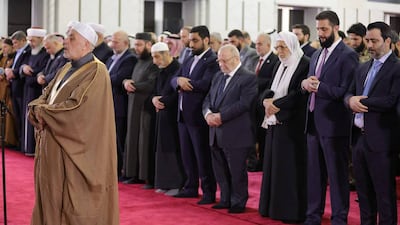At least 12 civilians, mostly Alawites, were killed in separate incidents of apparent sectarian violence in Syria's coastal and central regions on Monday, a war monitor said, following massacres earlier in March.
Six civilians including a local official were killed in an attack on members of the Alawite sect in the coastal Tartus province, said the Syrian Observatory for Human Rights.
The British-based watchdog cited unidentified local sources who accused the perpetrators of setting out from a military base used by forces belonging to Syria's new authorities, near the city of Baniyas. The war monitor, which relies on a network of sources inside Syria, said the attackers hurled “sectarian slogans and direct threats” before opening fire.
The monitor later said two members of a faction aligned with the new authorities had been arrested for their alleged involvement, and that members of the security forces had been deployed to order the faction to withdraw from the area.
Many from former president Bashar Al Assad's Alawite minority fear reprisals for his brutal rule. Last month saw the worst sectarian bloodshed since his overthrow, with massacres taking place largely in the Alawites' coastal heartland.
In a separate incident in the central city of Homs, two armed men “stormed a house and shot at those inside”, killing a woman and three of her children including a minor, said the monitor, adding they were also Alawites.
“Two civilians from the Sunni Muslim sect” who were visiting the family were also killed, the monitor reported. It did not say what was behind the incident. It accused one of the perpetrators of being a member of the General Security agency, and said the force was following up on the incident.
Official media did not immediately report on either of the attacks. The Syrian authorities have accused armed Assad supporters of sparking the violence by attacking the new security forces, with military reinforcements then sent to the areas.
Syrian President Ahmad Al Shara has vowed to prosecute those behind the “bloodshed of civilians” and has set up a fact-finding committee.
Mr Al Shara's Islamist group Hayat Tahrir Al Sham, which has its roots in the Syrian branch of Al Qaeda, led the offensive that toppled Mr Assad on December 8, and the new security forces are dominated by former Islamist rebels.
New government
Mr Al Shara has said a new transitional government will aim for consensus in rebuilding the war-torn country but warned that “will not be able to satisfy everyone”.
The transitional 23-member cabinet, without a prime minister, was announced on Saturday. “Any steps we take will not reach consensus – this is normal – but we must reach a consensus” as much as possible, Mr Al Shara told a gathering at the presidential palace, which was broadcast on Syrian television after prayers for Eid Al Fitr.
The autonomous Kurdish-led administration in north-east Syria rejected the government's legitimacy the day after it was announced, saying it “does not reflect the country's diversity”.
Authorities are seeking to reunite and rebuild the country and its institutions after nearly 14 years of civil war. Close supporters of Mr Al Shara and other figures aligned with him form the majority of the new cabinet. Mr Al Shara said the ministers were chosen for their competence and expertise “without particular ideological or political orientations”.
Most members are Sunni Muslim, reflecting the demography of Syria. Amid international calls for an inclusive transition, the new government has four ministers from minority groups – a Christian, a Druze, a Kurd and an Alawite, none of whom were handed key portfolios.
Mr Al Shara said the new government's make-up considered “the diversity of Syrian society” while rejecting a quota system for religious or ethnic minorities and instead opting for “participation”. He told the gathering: “A new history is being written for Syria … we are all writing it.”
Mr Al Shara and his wife, Latifa Al Droubi, greeted children whose parents were killed in Syria's 14-year civil war at the People’s Palace in Damascus as they marked Eid Al Fitr.





The United States on Monday called the formation of a new Syrian government a positive step, but said it would not ease sanctions until it has verified progress on priorities including acting against terrorism.
“We recognise the struggles of the Syrian people who have suffered decades under despotic rule and oppression of the Assad regime, and we hope this announcement represents a positive step for an inclusive and representative Syria,” State Department spokeswoman Tammy Bruce told reporters.
“However, Syria's interim authorities should fully renounce and suppress terrorism, exclude foreign terrorist fighters from any official roles [and] prevent Iran and its proxies from exploiting Syrian territory,” Ms Bruce said.
She also called on the interim authorities to “take meaningful steps to verifiably destroy Assad's chemical weapons, assist in the recovery of US and other citizens who have been disappeared in Syria, and ensure the security and freedoms of Syria's religious and ethnic minorities”.
On sanctions, she said: “Any adjustment to US policy towards Syria's interim authorities will be contingent on all of those steps being taken.”
With reporting from agencies

